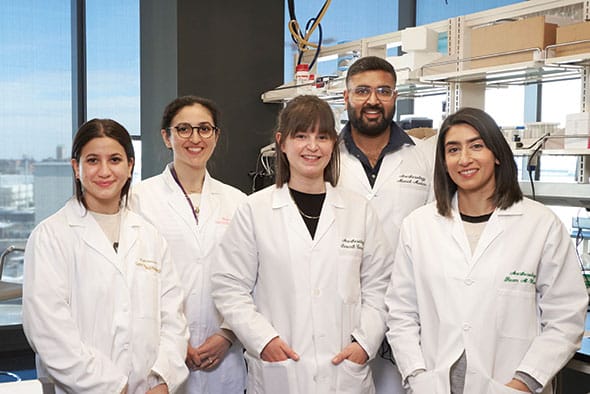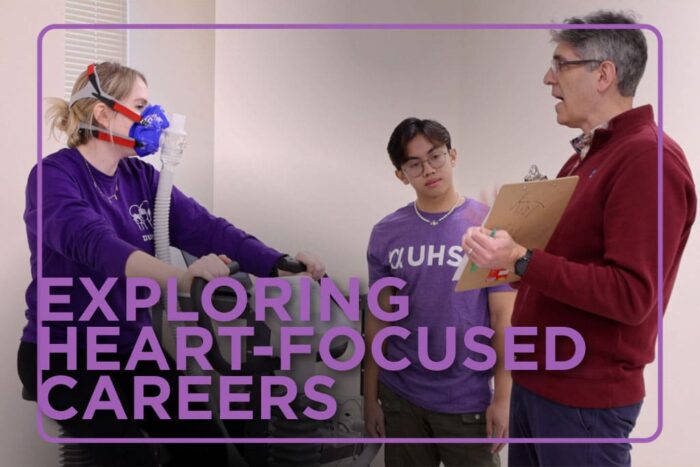
Al-Hasani Uncovers New Avenues to Treat Pain and Addiction
In 2017, Ream Al-Hasani, Ph.D., assistant professor of pharmaceutical science at University of Health Sciences and Pharmacy in St. Louis, and assistant professor of anesthesiology at Washington University School of Medicine in St. Louis, was recruited as one of the first researchers at the Center for Clinical Pharmacology. Since then, Al-Hasani and her center collaborators from the Department of Anesthesiology at the School of Medicine have been conducting groundbreaking research on the neurological effects of addiction and the brain’s response to pain or stress.
EXPLORING NEW METHODS
With much of her research focused on the kappa opioid receptor system and its potential to serve as a promising target for the non-addictive management of neuropsychiatric conditions, including pain, Al-Hasani has been engaged in a number of innovative projects, including her work to create new methods for measuring opioid peptides in living systems. Her efforts have resulted in the development of a reliable and reproducible process to allow other research labs to implement and benefit from this technique.
“When you are challenging your system, whether with something positive like exercise or negative like pain, brain neurochemistry is altered, which includes changes in opioid peptide levels that in turn activate opioid receptors as a response,” Al-Hasani explained. I primarily study the kappa opioid receptor system, which, when activated, can make you feel depressed or experience dysphoria, as opposed to euphoria, which is why it’s not addictive. One of the things we’re trying to do is figure out how to relieve aspects of pain without activating the opioid receptors that cause addiction and better understand the role of the kappa opioid system in the regulation of negative emotions in pain, addiction and stress.”
When you are challenging your system, whether with something positive like exercise or negative like pain, brain neurochemistry is altered, which includes changes in opioid peptide levels that in turn activate opioid receptors as a response...
One of the things we’re trying to do is figure out how to relieve aspects of pain without activating the opioid receptors that cause addiction and better understand the role of the kappa opioid system in the regulation of negative emotions in pain, addiction and stress.
“The kappa opioid receptor system has, in theory, great potential for targeted therapeutics that can help patients with a variety of neuropsychiatric conditions, but we’re just starting to scratch the surface of what it can do,” Al-Hasani continued. “I’m ready to work with the members of this incredible University community to build this new college that I hope will transform health outcomes and make a tangible difference on society.”
A NEW BRAIN PATHWAY
Building on her research related to reward processing in the brain, Al-Hasani’s team published research last fall in Nature Neuroscience, which identified a new brain pathway that further builds on the understanding of drug addiction and depression. The research uncovered a new role in reward processing for the neurotransmitter, GABA, which projects from the ventral tegmental area of the brain to the ventral nucleus accumbens shell.
“The dopamine projection from the ventral tegmental area to the nucleus accumbens region has been widely studied in the context of reward processing, but through our recent work, we identified that the GABA projection that runs alongside the dopamine projection also plays a role in reward processing,” Al-Hasani said. “Our team has been the first to identify the reward-processing function of this projection, and this work gives us the ability to consider a role for GABA as a new target mechanism for the treatment of addiction and depression.”
COLD PAIN AND HYPERSENSITIVITY
Al-Hasani’s team is also tackling the issue of cold pain. Painful hypersensitivity to cold is a surprisingly common problem for many people, including those with fibromyalgia, chemotherapy patients and individuals with chronic disorders, such as multiple sclerosis and diabetes, but there are currently no effective treatments. Al-Hasani recently received $2.1 million grant from the National Institutes of Health that will allow her to examine the role of the kappa opioid system in cold hypersensitivity and cold pain.
“Utilizing this grant, we’ll be further investigating the role of the kappa opioid receptor system in temperature and pain sensation,” Al-Hasani noted.
This work is important, as we’ll be examining the system’s potential to be a significant modulator of cold sensation, and a potential new point of intervention for reducing cold hypersensitivity. Through our efforts, we have an opportunity to conduct research that can lead to the development of a therapeutic that could relieve the symptoms of cold hypersensitivity.
As Al-Hasani’s cutting-edge research continues, she says collaboration has been the key to her success.
“It has been a really incredible experience working with the Center for Clinical Pharmacology and having the opportunity to build my research programs from the ground up,” Al-Hasani noted. “I have an outstanding team that is committed to pushing boundaries in our research, and I’ve also been fortunate to engage in some amazing research collaborations which have helped me grow personally as a researcher. I’m excited to see what the future holds.”
This story was first published in the spring 2022 issue of Script Magazine. To view past issues of Script, visit the Script Magazine archive.


